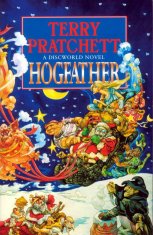
Hogfather
Terry Pratchett
445 pages
published in 1996
Terry Pratchett's Discworld books are pretty much a comfort read to me, notwistanding the cleverness of most of them. I can pull any of them out of my bookshelves at random and know I got a good, stimulating read on my hands, but one that is not too demanding. The perfect antidote to stress.
Hogfather is no expection. As you might guess from the picture to the left, the hogfather is the Discworld's version of Santa Claus, a friendly old man who delivers gifts of sausage and toys to good children and rides a sled pulled by pigs...
Unfortunately, this year the Hogfather is ...indisposed... and it is up to good old DEATH to take over, leading to utterly predictable but highly hilarious results. It is important that the Hogfather rides, not just to not disappoint the kiddies, but for far more important reasons as well, reasons which have to do with the Hogfather's past as a somewhat less kinder spirit.
Which may just be the reason why the Hogfather was indisposed of, as DEATH's old foes, the Auditors, the guardians of rule and order for its own sake have hired the Assassin's Guild to inhume the Hogfather, which apparently succeeded...
As in a number of other Pratchetts, the conflict here is between those who treat people as things and those who treat people as people, between those who want order in everything (the Auditors) and those who know that life brings chaos. It may sound like juvenile Moorcockery, but Pratchett (for the most part) does not hit you over the head with the theme, but lets it arise from the story itself.
The main villain of the book, Teatime is drawn brilliantly in his madness. He seems normal and rational, but you know mr. mind has long since gone out to enjoy the green fields of insanity. Everybody else in the book is frightened of him, with good reason. He is the ultimate example of treating people as things rather than as people.
What I like about Pratchett and what Hogfather is oen of the best examples of, is the way in which he manages to mix humour with horror, often in the same scene. The description of the land where the tooth fairy lives is enough to give you nightmares, if you are susceptible to this.
As with any Pratchett there is some not too subtle criticism of real world practises going on, in this case the commercial side of Christmas, done with enough humur not to make it sound like preaching.
With Hogfather managed to do the near-impossible: write a Christmas story without using the words "christmas" or "Santa Claus" and without becoming twee or cynical. Recommended, like most Pratchetts.
